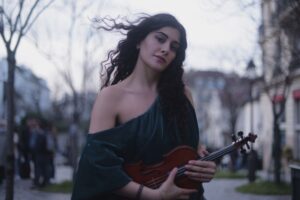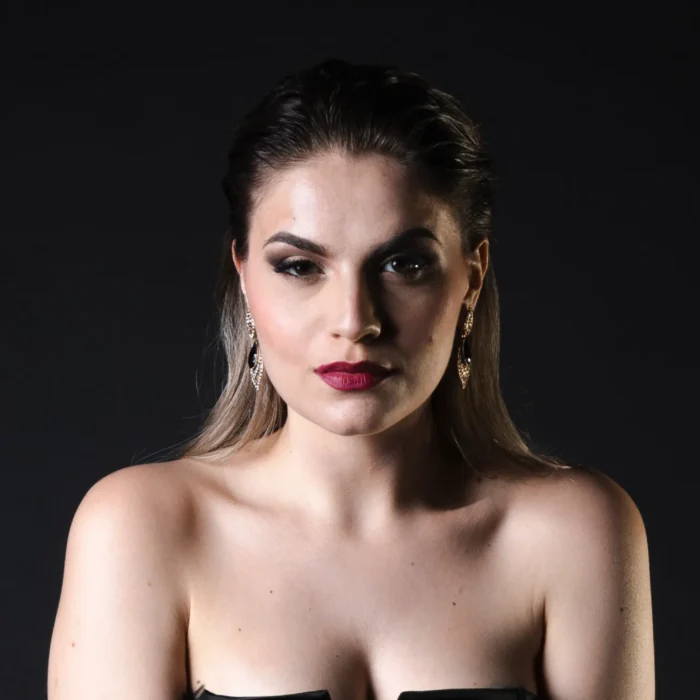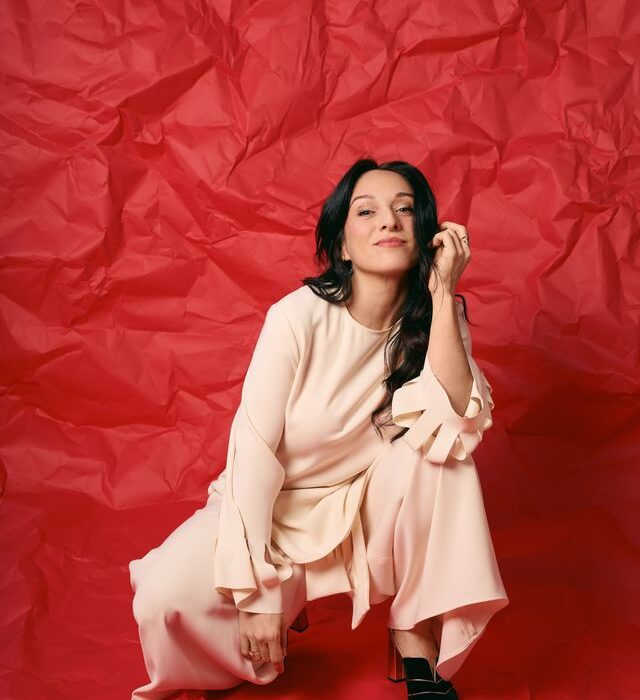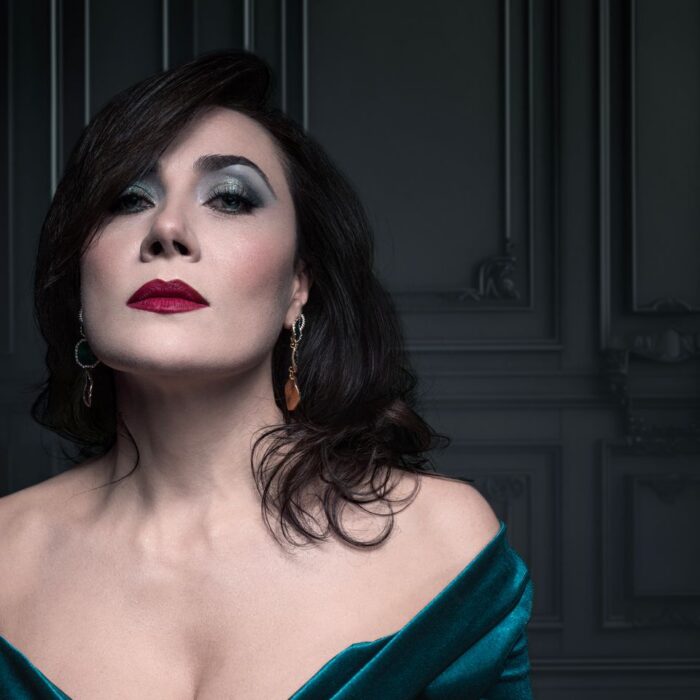
Q & A: Composer Layale Chaker on Creating ‘Ruinous Gods’ & Her Journey in Music
By David Salazar(Photo Credit Anna Rakhvalova)
A violinist. A composer. A polyglot whose musical world combines classical contemporary music with jazz, Arabic music, and improvisation. This is Layale Chaker, whose blossoming career, which has seen her work performed by such organizations as the Lincoln Symphony Orchestra, New York Philharmonic, and Nebraska Crossroads Music Festival, is set to take another step when her chamber opera “Ruinous Gods” gets its world premiere at the Spoleto Festival.
The new work, which will then get performances at the Wuppertal Opera this fall, is loosely based on the myth of Demeter and Persephone but in the context of refugee children and emotional toll their experiences take on them. The opera centers on a mother’s attempt to revive her 12-year-old daughter after the child falls into a non-responsive sleep triggered by trauma. The opera opens on May 24, 2024 and stars Leroy Davis, Taylor-Alexis Dupont, Teryn Kuzma, Sarah Shafer, Sharmay Musacchio, and Karim Sulayman.
OperaWire spoke to Chaker about the challenges of composing opera, her varied musical language, and her journey in music.
OperaWire: How did “Ruinous Gods” come about? What was the inspiration for the work?
Layale Chaker: The concept for “Ruinous Gods” first took root in the mind and heart of my colleague and soul sister, librettist Lisa Schlesinger. During our collaboration on a previous project about migration, she encountered an article about resignation syndrome in her research. A few months after completing that initial project, she approached me with the idea for “Ruinous Gods.” I think she asked me because she knew how deeply the subject would resonate with me, and I so appreciated her insight in recognizing this connection.
OW: You are a polyglot and your music tends to also incorporate a vast array of languages. What are the challenges of weaving together different musical styles to create a wholly new one?
LC: I did not choose to be a musical polyglot as much as I saw this language develop and mature as a consequence of my personal history, which is shaped by generational migration and decades of travel and study around the world. When I write, it is not a conscious act in that way. I simply write with the means I have, and it is only later, upon analyzing my work, that I recognize which elements came from where. I strive to protect the spontaneity and authenticity of this process as much as I possibly can, keeping it as unconscious as possible.
OW: How are those challenges augmented in an opera that also seems to be melding mythological story archetypes with modern day issues and how do you overcome them?
LC: The moment when challenges inevitably arise is when it is time to communicate with other musicians who are helping me bring the music to life. It is not so much a challenge as it is a matter of addressing their questions about the logic and structure of the piece. It becomes important to backtrack and trace how I arrived at a particular result so I can explain it clearly to my fellow musicians. This becomes augmented in opera – because the challenge of explaining the language now extends to everyone in the room, from stage direction to set design to light design to the conductor. There are layers of antique dramaturgy and modern mythology that coexist precisely because of what music is capable of doing, blurring the linearity of time in a way that I believe only music can achieve. Only music has the power to sculpt time and space in this manner. Time becomes cyclical, horizontal, vertical, contrapuntal. It is hard to then break down into words.
OW: What was the experience of working with Lisa Schlesinger on this opera?
LC: Working with Lisa has been transformative for me. In a way, she has given me the gift of a lifetime. Through this project, I have learned so much about myself, about life, about friendship, and about collaboration. I’ve discovered what I truly want to express on stage, how to convey it, and the means to do so. We both view poetics as political, believing in the power of beauty as a means to survive and resist, even amidst horrors. This experience has been cathartic for me and has given me the strength to keep going.
OW: What did you learn as an artist from the collaboration?
OW: What is opera to you? What is its unique power as an art form and what do you believe is essential to its continued evolution in the 21st century?
LC: With all the beauty and importance of the edifice, I believe its survival in the 21st century hinges on evolving its subject matters, reexamining a repertoire often centered on themes like femicide, and democratizing the art form. But this need for accessibility and relevance applies broadly to all art forms. Art in the 21st century must become an accessible means of expression for all. Art in the 21st century also needs to remain as free as possible from the urge to sanitize its subjects to align with institutional agendas. Although these art forms require institutional support to exist, and this creates a conundrum for which I have no answer. Art’s vocation is to provoke, to disturb, to re-question. Otherwise… what’s the point?
OW: Speaking more generally, I would like to know about your own musical journey and how you knew that you wanted to pursue this career as a composer and performer?
LC: I began imagining music as soon as I started learning to sing and play. My teacher, the Iraqi violinist Mohamed Hashem al Battat, greatly encouraged me and taught me how to improvise and eventually how to write down my ideas. His seamless navigation between classical repertoire and complete freedom in improvisation was something I admired and aspired to learn. As I honed my skills, I started sharing my work with peers and mentors. I was fortunate to be surrounded by support, which made composing something I could fully immerse myself in.
OW: What are some of the major challenges you have learned from throughout your career and what are some of the most memorable moments you’ve experience thus far?
I’ve learned that when working with a group, social skills become as important as artistic skills. The way the team collaborates profoundly influences the outcome of the artwork. This is a lesson I continue to learn from project to project. Human relationships are complex because humans are complex, but they are also incredibly beautiful. And so – every time a project materializes and takes flight, like a baby taking its first breath – is a memorable moment!


